Module 6 Unit 1
module_6__unit_1_were_you_at_home_yesterday

Very well, thank you. And how are you?
小同学们要注意噢:
在问候别人的时候,我们可以说: How are you? 别人问候你还好吗? 你可以回答:I’m well. 或者:I’m fine. Thank表示谢谢,但是我们在说谢谢你时 要用:Thanks . 或者:Thank you.
Chinese lesson
have a PE lesson
English lesson
Are you at home now?
Yes, I am. Ha ha …
Were you at home yesterday?
Yes, I was .
Were you in the cinema yesterday?
Match.
I
she
was
you
it
were
he we
they
Choose.
1. We (was/were) out yesterday. 2. It (is/was) windy now. And we (are/were) playing (in/under) the sun. 3.Lingling (was/is )at home yesterday. 4. They (was/were) at the park yesterday. They (is/ are) at home now. 5.Hello , (I am/ This is ) Sam speaking.
Choose .
Choose .
4.I want football the sun. A. play; on B. to play, in 5. --Hello , Daming. Xiaoyong. -- Hello, Xiaoyong. A. This is B. I am
Module 6 Unit 1 Happy birthday
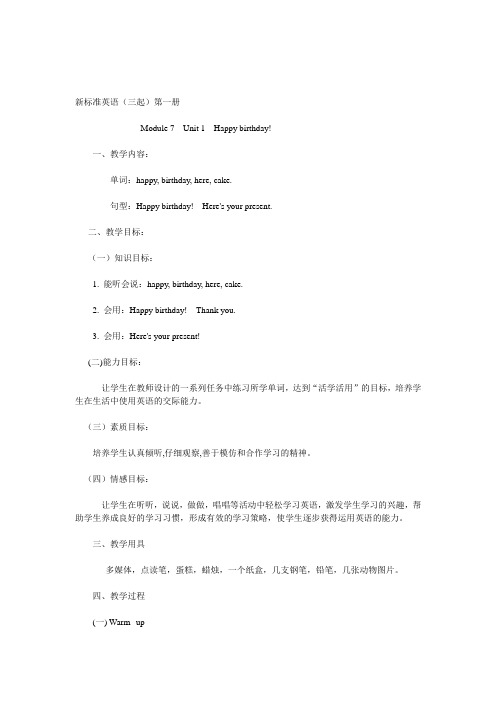
新标准英语(三起)第一册Module 7 Unit 1 Happy birthday!一、教学内容:单词:happy, birthday, here, cake.句型:Happy birthday! Here's your present.二、教学目标:(一)知识目标:1. 能听会说:happy, birthday, here, cake.2. 会用:Happy birthday! Thank you.3. 会用:Here's your present!(二)能力目标:让学生在教师设计的一系列任务中练习所学单词,达到“活学活用”的目标,培养学生在生活中使用英语的交际能力。
(三)素质目标:培养学生认真倾听,仔细观察,善于模仿和合作学习的精神。
(四)情感目标:让学生在听听,说说,做做,唱唱等活动中轻松学习英语,激发学生学习的兴趣,帮助学生养成良好的学习习惯,形成有效的学习策略,使学生逐步获得运用英语的能力。
三、教学用具多媒体,点读笔,蛋糕,蜡烛,一个纸盒,几支钢笔,铅笔,几张动物图片。
四、教学过程(一) Warm--up1. GreetingT: Good morning, boys and girls!S: Good morning, Ms Zhou!T: How are you?S: I'm fine, thank you. And how are you?T: I'm fine, too. Thank you.2. Sing the song “Ten little fingers.”3. Game: Take out a box with some pencils, pens and pictures in it. Ask three students to touch the objects. Then the teacher asks “What's this?” They should answer “It's a/an …”(二) Present task1. Show some pictures which are covered some parts on CAI. Let the students watch and guess “What's in each picture?” Then practice:T: What's this?S1: It's a pen.T: What's this?S2: It's a black cat....2. Show a picture of a birthday cake and ask “What's this?”The students can answer in Chinese “蛋糕”,Then the teacher repeats “It's a cake. It's a birthday cake.”Write “birthday and cake”on the blackboard, teach the two words several times.(三) Learn mew knowledge.1. Tell the students “This birthday cake is for Huang Huilan and Huang Yalan. Today is their birthday.” Then ask “What should we say when somebody has a birthday?” Help the students say “Happy birthday!” Write the sentence on the blackboard and teach “happy” “Happy birthday!”2. Tell the students when somebody says “Happy birthday to us, we should say thank you!”Write the sentence on the blackboard.3. Let the students say “Happy birthday!” to the twins. Then the twins should answer “Thank you!”4. Ask “What should we give when somebody has a birthday?”The students may answer in Chinese “礼物”,“Yes, present”Write “present”on the blackboard and teach it. Then say “We should give him/her a present, and say “Here’s your presents.”Write this sentence on the blackboard. Say it again, students repeat several times.5. Game “Lost and found”Collect some objects from the students, put them on the teacher's desk. Ask two or three students to be a keeper, and retur n the objects to the owners “Here's your pen/pencil/book …” The owners should answer “Thank you!”6. SB. Activity One. Play the tape, ask the students to look and listen, then answer questions “Who is having a birthday? How old is Sam? What's Sam's present?”7. Play the tape again. The students repeat.四、Practice.1. Ask the students to practice the text in pairs. Then ask some pairs to act it out.2. Have a birthday party for the twins.五、Finish the task.1. AB Exercises 1, 2, 3, 4.2. Learn the song “Happy birthday to you!”3. Game: Share the cake.六、Homework1. Make a birthday card. Write some prays in English.2. Review the new words and the drills.附:板书设计Module 7Unit 1 Happy birthday!A: Happy birthday!B: Thank you.A: Here’s your presents.B: Thank you.。
六年级英语上册M6Unit1You'vegotaletterfromNewYork教案外研版三起

1.Game.
教师引导学生拿一个身边的东西,在讲台桌的下面敲出声响,然后其他同学根据声音来判断他有什么东西。
2.Practice in pairs.
教师引导学生看图片并完成练习。
熟悉如何用句型“You’ve got a letter from New York.
尝试应用
Discuss.
Who is the letter from?
The letter is from Laura.
Who is the letter for?
The letter is for Sam and Amy.
2. Watchandanswer.
Askstudentsto watch the first video andanswer:
6.Look and answer.
Hello, boys and girls. I’d like to show you something today.What countries are they?
教师出示中美国旗,询问学生是否知道这些是哪国国旗。
7.Listen andanswer.
Has he got a book about China?
Where does Laura live?
She lives in New York.
Where is Laura from?
She is from London in the UK.
3. Watch and answer.
播放第二遍视频,让学生了解更多信件的信息。练习本课重点句型:You’ve got a letter from New York.Daming hasgot a Chinese dragon kite and we often fly it in the park.
Module6Unit1_You've_got_a_letter_from_New_York

from Daming.
Listen and answer:
1、Who sent the letter to Sam and Amy? Laura sent the letter to Sam and Amy. 2、 Where is Laura from? She is from London in the UK. 3、What has Daming got? He has got a Chinese dragon kite. 4. Where does Laura live ? Is she American ? She lives in New York , but she is not American. 5. Does Laura want to visit China ? Yes , she wants to visit China next year .
6.请给我写信,我们会成为笔友。
Listen and answer.
1.Where is the letter from? The letter is from New York. 2. Is the letter from Daming? No, it isn't.
You’ve got a letter
from New York ,but it’s not
Module 6 Unit 1 You've got a letter
from New York.
chant
他她它用has,连接got变拥有。
He has got ,She has got, It has got,要永记。
其他主语用have,形式都成have got。
I have got , We have got , You have got , They have got
外研版八年级英语上册Module6 Unit1 课件
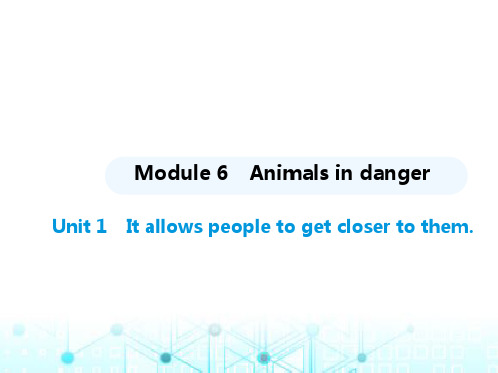
D.careless enough
解析 enough修饰形容词时要后置,先排除选项A和选项C;
根据题干中的“Amy的报告做得很好”可知,她足够“认
真”,注意到了每个细节,careful enough符合题意。故答案为
B。
25.(人与自我·乐于实践)(2024黑龙江哈尔滨南岗区期末)
—How can we know the answer? —We need to do some research to A the answer.
Ⅲ.用所给词的适当形式填空 11.(新素材·神舟十八号)A lot of young teenagers are interested (interest) in our country’s Shenzhou ⅩⅧ mission. 12.It’s very dangerous(danger) for a young child to
the poor children in Guizhou.
9.(国防教育) My brother joined the Chinese army because he wanted to protectour country.
10.(人与社会·畅想未来) I’m going to be an astronaut when I grow up.
swim alone. He or she must go with an adult. 13.(探教材·P42) That means we can give money to help (help)
protect the animals.
14.(思维品质·评价思维)(2023重庆西南大学附中期末)It’s impossible(possible) for them to travel around the world if they don’t have much money. 15.I think it’s necessary to take (take) measures to protect the wild animals living there.
外研(三起)小学英语六年级上册Module6Unit1课文及翻译

,Listen and read .部分翻译3Listen and say .部分翻译Lookjisten and say .看一看.曰听,说f姆:你有二本关于中国的书吗?姆:你有一本关于美国的书吗?4,Practise.部分翻译....1.1.2.3Module6 UnitlModu e6 UnitllLook» listen and say .部分翻译① Look> listen and say .部分翻译am : Have you got a book about China?hon : No 』haven't .翰:不,我没有。
am : Have you got a book about the US?hon : NoJ haven't .0翰:不,恋殳有。
am : What book have you got?I :你有什么书?hon : I've got a book about the wor d .翰:我有一本关于世界的书。
(2)Listen and read .部分翻译Listen and read ./ / / / /Z / / / / / / / Z / / / / / /听—听,读一^ou've got a letter from Mew York,but it's not from Darning.尔们有一封来自纽约的信,但是它不是大明寄来的.Dear Sam and Amy,亲爰的萨姆和埃米:am Daming's friend and I want to be your friend too.I live in New York,but I am not American.I am from London in the UK.So we are all British!我是大明的朋友,我也想成为你们的朋友。
外研版英语九年级上module6unit1课文及其翻译

Module 6 save our world
UNIT1 It’s wasteful to throw away paper and metal.
扔掉纸张和金属是很浪费的行为。
Betty:Hey, you guys! 嘿,伙计Biblioteka ! Guess what!
猜猜!
We've just got an email from a reader of our New Standard!
“……例如关灯,那样我们就不浪费电了。”他在结束时说:“我有信心如果人人都想着环境和循环使用的话,我们就可以保护空气和海洋,而且可以帮助拯救我们的世界。如果我们不这样做的话,未来就没有希望。”
Tony:Let's ask Zhao Ming to write something.
让我们邀请赵明写点东西。
太好了!上面说什么?他说:“当我正在做我最喜欢的科目的作业时,我看了你们那令人愉快的在线杂志。”
Daming:He read Mr Jackson's article!
他读了杰克逊先生的文章!
Betty:He says, "When are you going to write about environmental education?
“……筹款帮助贫困地区的学生。但是不仅仅是在学校,而且在家里,我们要节约能源和循环使用……?
外研七年级上册Module 6 Unit1教学课件(共45张PPT)

Module 6 Unit 1
What do monkeys eat? They eat … fruit Do they eat meat? No, they don't. They eat fruit.
What does the tiger eat? It eats … meat Does it eat fruit? No, it doesn’t. It eats meat.
What is an elephant like?
It’s very big and strong.
Module 6 Unit 1
What’s the animal? It’s … a panda
How many pandas are there in this picture? There …
What does the panda look like?
Module 6 Unit 1
行为动词的一般现在时(2) (1) They speak good English. They don’t speak good English. Do they speak good English? Yes, they do. / No, they don’t.
It’s very dangerous.
What’s the animal? It’s … a monkey What is the monkey like?
It’s very clever.
Module 6 Unit 1
What’s the animal? It’s … a tiger What does a tiger look like? It’s black-and-yellow. What is the tiger like?
外研版九年级英语上册 M6 Unit 1【精品课件】

dinner,I'll finish it before I go to bed. Anyway, you wanted me to learn an instrument. Dad:I want you to get into the habit of❻doing your homework as soon as you come home from school. If you start now,you'll finish it before dinner.
知识点 1 spend...(in) doing sth.花费……做某事 eg:I spend too much time (in) watching TV. 我看电视花的时间太多。
考向 辨析:spend, pay, cost与take
(in) doing/on doing sth.
人+spend+时间/金钱+
知识点 6 get into the habit of...养成……的习惯
eg:You ought to get into the habit of planning your work at the beginning of each week. 你应该养成在每周开始就安排好你的工 作的习惯。
考向 get into the habit of相当于form the habit of, 其中habit是名词,意为“习惯”。 与habit相关的短语: be in/have the habit of 有……的习惯 break the habit of 改掉……的习惯 cultivate a habit 培养一种习惯
外研(三起)小学英语六年级上册Module6 Unit1 课文及翻译

Module6 Unit1Module6 Unit1 (1)1Look,listen and say.部分翻译 (1)2Listen and read.部分翻译 (1)3Listen and say.部分翻译 (2)4.Practise.部分翻译 (3)① Look,listen and say.部分翻译Look,listen and say.看一看,听一听,说一说。
Sam:Have you got a book about China?萨姆:你有二本关于中国的书吗?Jhon:No,I haven't.约翰:不,我没有。
Sam:Have you got a book about the US?萨姆:你有一本关于美国的书吗?Jhon:No,I haven't.约翰:不,我没有。
Sam:What book have you got?萨姆:你有什么书?Jhon:I've got a book about the world.约翰:我有一本关于世界的书。
②Listen and read.部分翻译Listen and read.听一听,读一读。
You've got a letter from Mew York, but it's not from Daming.你们有一封来自纽约的信,但是它不是大明寄来的。
Dear Sam and Amy,亲爱的萨姆和埃米:I am Daming's friend and I want to be your friend too.I live in New York, but I am not American. I am from London in the UK.So we are all British!我是大明的朋友,我也想成为你们的朋友。
我住在纽约,但是我不是美国人。
我来自英国伦敦。
所以我们都是英国人!Do you 1ike China? I want to visit China next year. Daming has got a Chinese dragon kite and we often fly it in the park. It's difficult for me.你们喜欢中国吗?我想明年游览中国。
Module;6;Unit;1;Laughter;is;good;for;you1
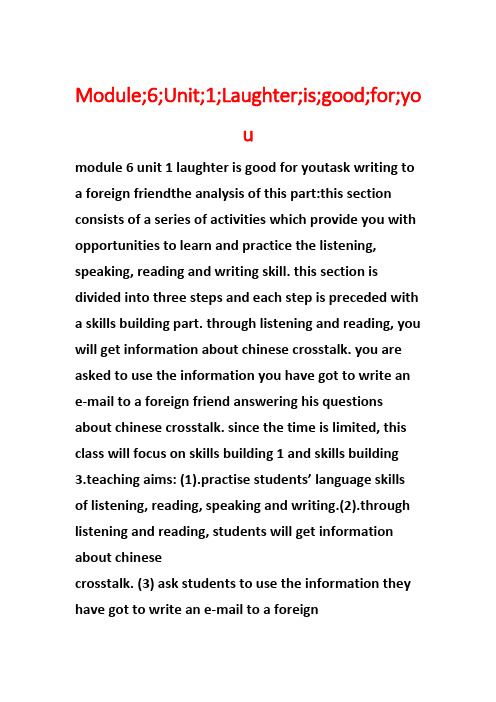
Module;6;Unit;1;Laughter;is;good;for;youmodule 6 unit 1 laughter is good for youtask writing to a foreign friendthe analysis of this part:this section consists of a series of activities which provide you with opportunities to learn and practice the listening, speaking, reading and writing skill. this section is divided into three steps and each step is preceded with a skills building part. through listening and reading, you will get information about chinese crosstalk. you are asked to use the information you have got to write an e-mail to a foreign friend answering his questions about chinese crosstalk. since the time is limited, this class will focus on skills building 1 and skills building 3.teaching aims: (1).practise students’ language skills of listening, reading, speaking and writing.(2).through listening and reading, students will get information about chinesecrosstalk. (3) ask students to use the information they have got to write an e-mail to a foreignfriend answering his questions about chinese crosstalk.teaching important points difficult points:(1). find and underline the main ideas.(2). get some information about chinese crosstalk.teaching procedures:step 1. lead-in:(1) i need to know how many of you will go to watch the play this saturday. i’ll haveto book the tickets.(2) i want to know why you are so interested in the play.(3) i would like to know how you will go to the theatre.discuss in groups and decide which one means the most important request and which one is the least important request. and give your reasons.step 2. activity 1: identifying priorities1.how to identify the priorities.(1). ‘i need…’ most important(2). ‘i want…’ somewhat important (3). ‘i would like…’ least important2. enjoy a chinese crosstalk to introduce the art form to the students.step 3. task 1: answering questionsask students to read part a on page 10 to make sure what they are asked to do when listening to the recording. while listening, they should take some notes and pay attention to the words used in bill’s requests, and decide what is the most important ,somewhat important or the least important. then check the answers.step 4. task 2 correct notesask students to read the guidelines of part b on page 11 to know what they should do to finish this part. then listen to the radio talk show and make corrections. if they are not sure about their answers, let them listen to it again. then check the answers.step 5. task 3 readingask students to read the article in part c on page 11 and find useful information to the questions in part a..step 6. activity 2: answering questions in ane-mail1. ask students to read the guidelines and the two points in this part. students will know what they should pay attention to when they use an e-mail to answer questions.2. read the sentence structures to know what informal language and formal language they can use to answer questions in e-mails.step 7. task 4:writing an e-mail1.ask students to work in pairs to discuss what they should write in the e-mail to bill. decide the order of the answers according to the importance of the questions. they should also decide what structure they should use to write the e-mail.2.ask students to write the e-mailstep 8. homeworkfinish the e-mail.。
外研版八年级英语上Module6_Unit1解析
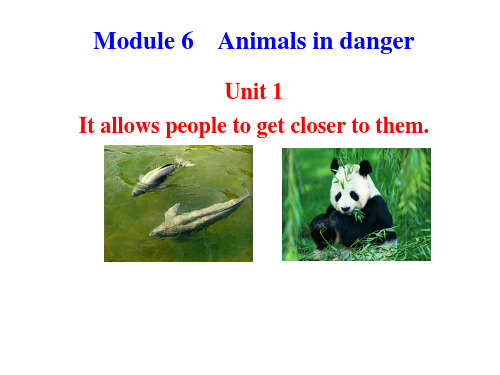
Then listen and read
(Lingling and Betty are leaving the zoo.) L: Did you like the zoo? B: Yes! I saw the pandas at last! But I am more interested
to see the pandas in the Wolong Panda Reserve, because it allows people to get closer to them. L: It’s sad to think of the pandas and other animas in danger. B: We need to protect them better. L: Yes. Many wild animals don’t have a safe place to live, because villages and farms are growing bigger and are taking away their land and forests.
Language Points
1. I saw the pandas at last! at last = in the end= finally 最后、终于 他终于取得了好成绩。 He got good marks ___at__l_as_t_. 我们昨天终于吃了烤鸭子. Yesterday we ate roast duck ___a_t_l_a_st.
• (2) He allowed me to take his dictionary.
• (3) He allows his son too much money.
bear elephant giraffe lion snake
外研版(三起)六年级英语下册Module 6 Unit 1
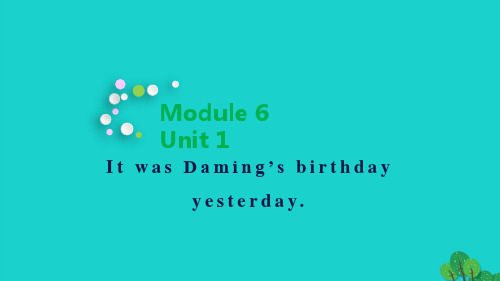
Watch, listen and answer.
1. Who bought Daming a book?
Simon’s mum bought Daming a book. 2. What is the book about?
It’s about space travel.
3. Is Daming interested in space?
Module 6 Unit 1
It was Daming’s birthday
yesterday.
space太空
on the earth 在地球上
Who has been to the space in China?
杨利伟 聂海胜 费俊龙 刘伯明 翟
taikonaut 志 刚
景海鹏
5
How did they go there and come back?
3.What did they give Simon's mum?
Watch, listen and answer.
1. Did they finish the book?
Yes, they did. 2. What did they decide to do?
They decided to make a paper spaceship together. 3. What did they give Simon's mum?
Tereshkova 捷列什科娃
From Russia 俄罗斯人 Tereshkova is the first woman taikonaut in the world.
Watch, listen and answer.
1.Did they finish the book? 2.What did they decide to do?
外研版九年级下册《Module 6 Unit 1》教学设计
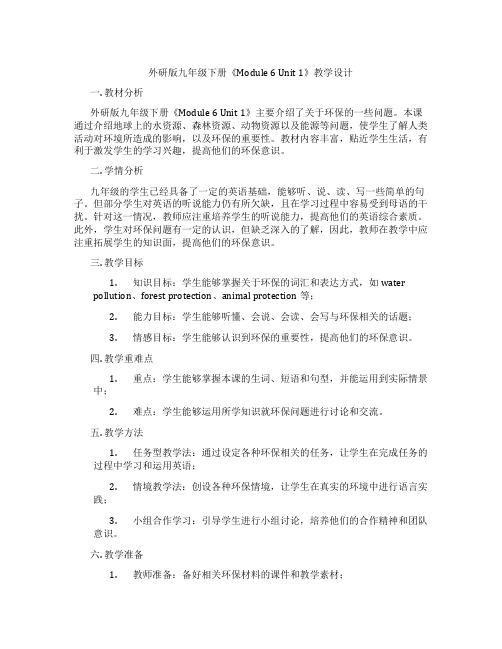
外研版九年级下册《Module 6 Unit 1》教学设计一. 教材分析外研版九年级下册《Module 6 Unit 1》主要介绍了关于环保的一些问题。
本课通过介绍地球上的水资源、森林资源、动物资源以及能源等问题,使学生了解人类活动对环境所造成的影响,以及环保的重要性。
教材内容丰富,贴近学生生活,有利于激发学生的学习兴趣,提高他们的环保意识。
二. 学情分析九年级的学生已经具备了一定的英语基础,能够听、说、读、写一些简单的句子。
但部分学生对英语的听说能力仍有所欠缺,且在学习过程中容易受到母语的干扰。
针对这一情况,教师应注重培养学生的听说能力,提高他们的英语综合素质。
此外,学生对环保问题有一定的认识,但缺乏深入的了解,因此,教师在教学中应注重拓展学生的知识面,提高他们的环保意识。
三. 教学目标1.知识目标:学生能够掌握关于环保的词汇和表达方式,如waterpollution、forest protection、animal protection等;2.能力目标:学生能够听懂、会说、会读、会写与环保相关的话题;3.情感目标:学生能够认识到环保的重要性,提高他们的环保意识。
四. 教学重难点1.重点:学生能够掌握本课的生词、短语和句型,并能运用到实际情景中;2.难点:学生能够运用所学知识就环保问题进行讨论和交流。
五. 教学方法1.任务型教学法:通过设定各种环保相关的任务,让学生在完成任务的过程中学习和运用英语;2.情境教学法:创设各种环保情境,让学生在真实的环境中进行语言实践;3.小组合作学习:引导学生进行小组讨论,培养他们的合作精神和团队意识。
六. 教学准备1.教师准备:备好相关环保材料的课件和教学素材;2.学生准备:预习本课的生词和短语,了解环保的基本知识。
七. 教学过程1.导入(5分钟)教师通过展示一些环保问题的图片,如水污染、森林砍伐、动物濒危等,引导学生关注环保问题,激发他们的学习兴趣。
2.呈现(10分钟)教师通过课件呈现本课的生词、短语和句型,让学生进行认读和学习。
Module 6 Unit 1 外研版英语九年级上册知识点详解
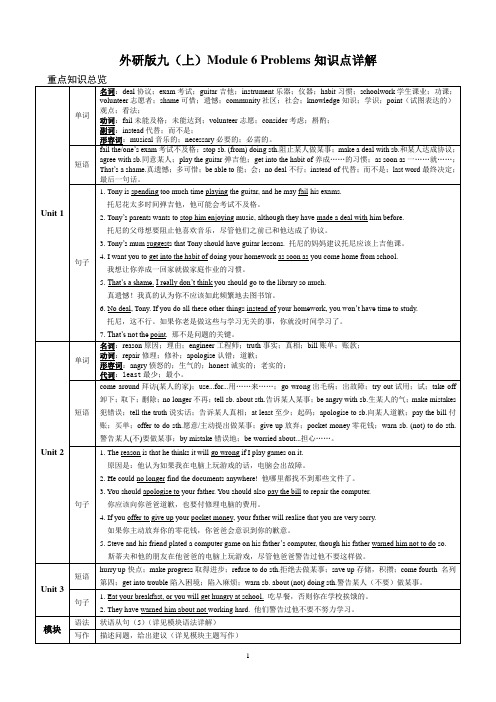
外研版九(上)Module 6 Problems知识点详解Unit 1If I start after dinner, I’ll finish it before I go to bed.★(A1).【知识点再现】Tony is spending too much time playing the guitar, and he may fail his exams. 托尼花太多时间弹吉他,他可能会考试不及格。
【知识点1】【辨析】spend,take,cost与pay的用法辨析:①spend其主语是人,宾语可以是金钱、时间、精力等,意为“度过”、“花费”,常用于以下两种句型:●sb.+spend+时间/金钱+(in) doing sth. 意为“某人花费时间/金钱做某事”。
如:Jim spends too much time playing computer games. 吉姆花太多时间玩电脑游戏。
●sb.+spend+时间/金钱+on sth. 意为“某人在某方面花费时间/金钱”。
如:Lucy often spends her money on fine clothes. 露西经常把钱花在漂亮衣服上。
②take用作“花费”时,常用于以下句型:●It takes/took+sb.+time+to do sth.“做某事花了某人多少时间”,It是形式主语,真正的主语为to do sth.It took them three years to build this road. 他们用了三年的时间修完了这条路。
●doing sth. takes sb.+时间“做某事花了某人多少时间”。
如:Repairing this car took him the whole afternoon. 他花了一下午修车。
③cost其主语是物、事情或用it作形式主语,宾语可以是钱、时间等,意为“价钱为;花费;值”等。
常用句型:●sth.+cost+money. 意为“某物花了多少金钱”。
六年级英语下册 Module 6 Unit 1 I bought a book for
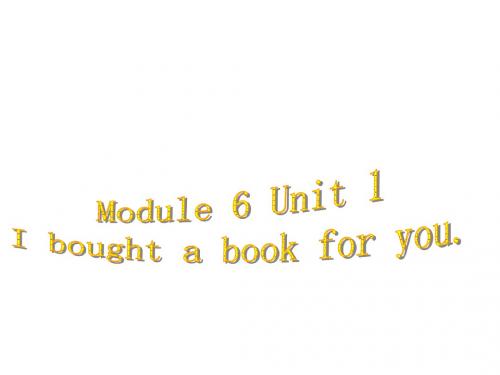
4.我们给了他们一些书。 We gave them some books. = We gave some books to them.
5.谁给了她一只钢笔? Who gave her a pen? = Who gave a pen to her?
Liwei . 4. Yang Liwei is __i_n_te_re_s_te_d__ in space
travel.
ANSWER QUESTIONS:
1. Who bought a book for Daming?
Simon’s mum bought a book for Daming.
2. What is the book about?
例如:这是一本有趣的书。
This is an interesting book.
例如:我对这本书很感兴趣。
对…感兴趣 be interested in
I am interested in this book.
“interesting” “interested”
1. I’m very ___in_te_r_es_te_d__ in this book. 2. This book is very _i_n_te_re_s_ti_ng___for me. 3. Space travel is __i_nt_e_re_st_in_g___ for Yang
____I_t___cheats__m__e___.
• Bob is going to give ___ a talk. A, we B, us C, our D, ours
• The book is Ben’s. Please give it to ___. A, he B, him C, his D, himself
Module6___unit1__讲课A_postcard_from_New_York1
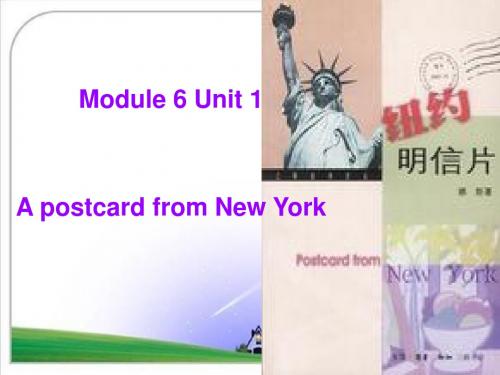
Auld lang syne
Should auld acquaintance be forgot, And never brought to mind? Should auld acquaintance be forgot And days of auld lang syne? For auld lang syne, my friends,
She’ s got a pen friend.
Have you got? Have you got? Do you want to know him? Do you want to know him? Yes, I do. Yes, I do.
学习目标: 1、知识目标 单词:someday soon chopsticks knife fork 句子: Daming has got a chinese kite and we fly it in the park. I've got some chopsticks but they are difficult. 2、能力目标 通过不同国家的人们使用的物品进行文化对比, 熟练掌握have got 的用法 3、情感目标对不同国家的文化差异有所了解,善 于交友,珍惜友情。 重点和难点: have/has 的用法以及连词“and”“but”的用法。
用and 或but 将两个句子连成一句
Lingling
Lingling has got a bike. She can’t ride it.
Lingling has got a bike but she
外研版九年级上册Module6unit1

人有了知识,就会具备各种分析能力, 明辨是非的能力。 所以我们要勤恳读书,广泛阅读, 古人说“书中自有黄金屋。 ”通过阅读科技书籍,我们能丰富知识, 培养逻辑思维能力; 通过阅读文学作品,我们能提高文学鉴赏水平, 培养文学情趣; 通过阅读报刊,我们能增长见识,扩大自己的知识面。 有许多书籍还能培养我们的道德情操, 给我们巨大的精神力量, 鼓舞我们前进。
habit n. 习惯 /'hæbɪt/
get into the habit of
schoolwork n. /'sku:lwə:k/ 学生课业;功课
养成….的习惯
It’s a good habit to finish schoolwork on
time.
community n. /kə'mju:nətɪ/ 社区;社会
play the violin 拉小提琴
/ɪg'zæm/ exam 考试 n.
参加考试用 take an exam He is taking the exam.
注意:考试及格用 pass an exam。 考试不及格用 fail an exam。
/feɪl/
未能及格;未能达到 v.
He passed the exam.
You'd better consider what I suggested.
It's raining again ! We
can't go for a picnic.
What a shame!
